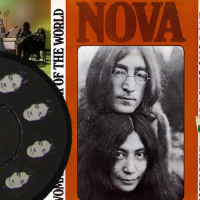There’s a moment during the eight-disc set John & Yoko: I’m Not the Beatles when every Beatles fan will envy Village Voice journalist Howard Smith.
As Smith interviews the couple in their Bank Street, New York City apartment on January 23, 1972, they listen to the radio station WPLJ’s Beatles marathon day. Clearly in a reflective mood, John Lennon suddenly turns up the volume and excitedly listens to “Happiness Is a Warm Gun.” He subsequently treats Smith — and listeners — to an account of how he wrote and recorded the track, then discusses other seminal Beatles songs such as “Strawberry Fields Forever.” Smith grows quiet, obviously basking in the glow of Lennon’s rare peek into the Beatles’ recording process. Any fan would love the opportunity for such a private tutorial, and this box set is as close as it gets.
I’m Not the Beatles: The John & Yoko Interviews 1969-1972 with Howard Smith displays how the duo changed in a relatively short time.
In the first two interviews — one conducted during the Bed-In in Montreal, the other in Toronto — Lennon and Yoko Ono appear more defensive and uncertain. Lennon remains intentionally vague about the Beatles’ future, seemingly more interested in discussing his new projects with Ono. In turn, Ono appears stung by criticism from fans and journalists — understandably, since their romance was dissected by media at the time. Their next meeting, in 1970 at the Regency Hotel, finds the couple clearly searching for meaning, wanting to find peace within themselves as well as in the world. They discuss the making of the Plastic Ono Band album and explain primal scream therapy; in addition, they explore how they created two new art films. Hearing Lennon describe the now legendary album as completely new lends fresh insight into his solo masterpiece.
Smith reunites with Lennon and Ono at the St. Regis Hotel on September 9, 1971 as part of a promotional jaunt for Imagine. The couple expresses how they had to “sugarcoat” Lennon’s messages to make them more palatable, and Lennon offers opinions on his ex-bandmates’ solo albums.
The highlight of the entire package, however, occurs during that 1972 interview: Here the couple seems more relaxed, less angry, and more comfortable discussing the past. While they no longer participate in primal scream therapy, they reveal how it helped their emotional growth. Lennon expands upon Beatles days and casually talks about regularly keeping in touch with Paul McCartney, George Harrison, and Ringo Starr — thus exploding the myth of how they were constantly at each other’s throats.
They seem to have settled into their married lives and are less antagonistic toward Smith and media in general — Lennon even states he wouldn’t mind having a television show or he and Ono becoming the “Sonny and Cher” of the peace movement.
Smith discovered these master reels buried in his West Village loft; since they are 40 years old, the sound quality greatly varies. Sometimes the volume wildly fluctuates, and distortion occasionally blurs their voices. Perhaps more extensive remastering and restoration should have been executed. In addition, researchers will find the lack of indexing frustrating; if one wants to find a particular section or topic, listening to virtually the entire disc is necessary.
In spite of these shortcomings, I’m Not the Beatles: The John & Yoko Interviews 1969-1972 should fascinate any Beatles and Lennon fan. Imagine dropping in on a private conversation among three friends, expressing opinions on a wide variety of topics, and that summarizes the experience of listening to this eight-disc set. It perfectly encapsulates how Lennon developed artistically and personally in a short time span, and reveals the hidden lives of an otherwise very public couple.
- The Rescued Early Paul McCartney Song That Completed ‘Beatles For Sale’ - December 4, 2024
- A Rare Beatles Cover Proves John Lennon Was Wrong About His Voice - November 26, 2024
- How John Lennon Came Roaring Back on the Beatles’ White Album - November 22, 2023




